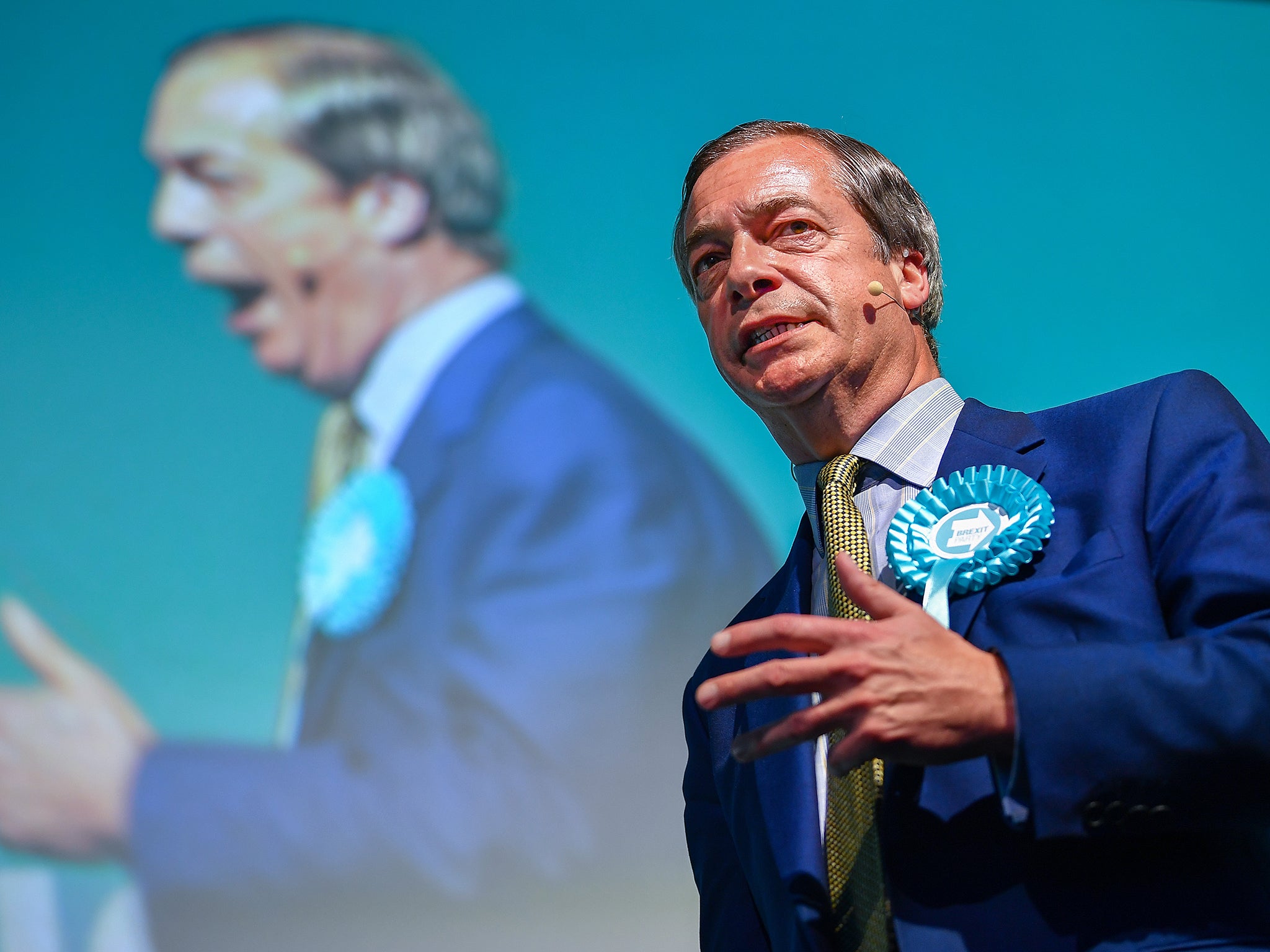Brexit showdown: It’s time for us to stop underestimating Nigel Farage
Businesses have mocked him and the left has dismissed him, yet the scourge of Remainers has still triumphed. Chris Blackhurst looks at why


We were sitting in the green room, waiting to review the papers on Sky television, when Nigel Farage asked if I’d like to join him outside, for a fag.
I said I didn’t smoke, but that I’d join him anyway. So there we stood, skulking outside the studio on Millbank, in Westminster, while Nige had a crafty one. Meanwhile, the floor manager for the show must have been having kittens that the two guests had upped sticks and vanished.
Nobody else would have done that. Plenty of talking heads on TV enjoyed a cigarette, but it’s impossible to think of one who would just have absented themselves in such a fashion. We came back through the door, grinning like naughty schoolboys. It was par for the course for Farage.
He’s everybody’s cheeky chappie, the racy uncle who, when you’re 15, offers you a sneaky swig of beer and says not to tell your old man. Always done with a broad smile and twinkling eyes.
Because of his upfront, devil-may-care persona, it’s hard to take Farage seriously. Indeed, the big business community, which is largely Remain, dismisses him and with him, his pro-Brexit cause. Worse, their lips curl when his name is mentioned. They deride him and they revile him. You can almost hear them saying that if he worked in their organisation he would not stand a chance of promotion – in fact he’d be lucky to have a job at all.
In their view, he’s a lightweight, a chancer, a bounder who would prosper selling snake oil but nothing remotely genuine or substantial.
Oh, to have been a fly on the wall of their gated mansions as the EU election results came in. How they must have raged at the screen, as up popped Farage, beaming, as yet another triumph was recorded. The man even prefers proper business attire, a pinstripe and a tie. The gall of him!
They would be well advised to study Farage. Even though they might not agree with his views on the EU, the Brexit leader holds lessons for anyone practising marketing, branding or communications.
With Farage everyone knows what they’re getting – and that is the essence of a winning brand. His message, his ethos, is simple and direct. And constantly repeated, never wavering. It’s what his new party calls itself: Brexit. The name is plain and easy, without complications and fuss, and crucially, minus fudge.
When voters went into the polling booths and scanned down the long list of those standing, there was no mistaking what the Brexit candidates stood for. It was in the title.
The same cannot be said for their rivals in Labour, Conservatives, Liberal Democrats, Greens or even, Change. You want to vote to leave the EU, you put a cross against the one that says starkly “Brexit”. You want to stay, by contrast, and who do you select? Tellingly, there was not a Remain party to choose.
If you knew the Lib Dems were Remainers you might have voted for them, but only if you knew. Likewise, the Greens. Which is why those two organisations prospered. At least they had an official policy that was clear. Where the two main parties were concerned there was only discord and confusion, and look at the outcome.
Farage can’t be manufactured. He’s not an identikit leader that can be assembled from a text book or during a course at business school. He’s entirely natural, and thanks to that, completely genuine.
Watching him, and observing the harrumphing from the corporate establishment reminds me of how it reacted when Richard Branson first impinged on its consciousness, after Virgin began to erode British Airways’ market share. As now, the C-suiters shook their heads and spluttered. They were led of course by Lord King, the chairman of BA, who could not for the life of him understand how somebody who wore a jumper and sported a beard, and was so smiley and touchy-feely, could threaten his mighty airline.
By his very image and behaviour Branson sold the essence of Virgin. It was young and vital, not fussy, and it put customers first. BA, with its emphasis on tradition and braided uniforms, appeared fuddy-duddy and less certain by comparison – rather like the position of the Conservatives and Labour when put alongside Farage’s party.
For Farage, read Trump – another genius at self-promotion. The president’s slogan was Make America Great Again. Can anyone recall Hillary Clinton’s pitch? In just four, crisp words?
We live in an age of instant messaging. We’ve got numerous demands on our time, we can’t dwell and linger – we can but we have to make time for that, to make time to read. We’re always only one click away, one press of the remote, from something else. For millennials they’ve never known anything else.
Anything that involves dissection and analysis to ascertain the true meaning will fail. It won’t be got across, won’t have any impact.
A short timeframe is all we have. The language is of Snapchat, breaking news, tweets, notifications, elevator pitches. Marry speed with authenticity, with an easily understood mantra you clearly believe in, and you can win – look at Nigel Farage.
Chris Blackhurst is a former editor of The Independent, and director of C|T|F Partners, the campaigns, strategic, crisis and reputational, communications advisory firm
Join our commenting forum
Join thought-provoking conversations, follow other Independent readers and see their replies
0Comments